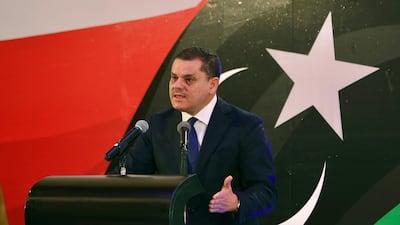The US, European powers, Egypt, Jordan and the UN Security Council hailed a vote by Libya's parliament to approve a unity government to lead the North African nation to elections in December.
In a joint statement, the foreign ministers of France, Germany, the US, Italy and Britain said: "We applaud the Libyan people for their determination to restore unity to their country."
They reiterated a call for "the withdrawal of all foreign fighters and mercenaries from all of Libya".
"This outcome is a fundamental step on the path towards the unification of Libyan institutions and a comprehensive political solution to a crisis that has tested Libya and its people," the joint statement said.
Similar comments were made earlier at a joint news conference by the foreign ministers of France, Germany, Egypt and Jordan.
France's Jean-Yves Le Drian called it a "major advance" while his German counterpart Heiko Maas said it was an "excellent development".
Egypt's Foreign Minister Sameh Shoukry called the development "good news".
"The fact that yesterday there was a vote of confidence concerning the political process that has been started ... that's an important point," he said.
"It's a step towards stability, security and the sovereignty of Libya."
UK Foreign Minister Dominic Raab congratulated Libya "on an important step towards a more stable future."
"The priority now must be implementing the ceasefire, holding elections and delivering essential services for Libyans," Mr Raab said.
The EU also welcomed the new government, but said it could impose sanctions on foreign or domestic spoilers who undermine peace efforts.
"This is a significant breakthrough that creates the conditions to reunify institutions in Libya and lead the country towards national elections on December 24," EU foreign policy chief Josep Borrell said on behalf of the 27 member states.
"We call on all Libyan stakeholders to ensure a timely and seamless transfer of power to the Government of National Unity."
Later on Friday in New York, the UN Security Council agreed on a statement in support of Libya’s new unity government and urged it to pave the way for national elections on December 24 this year.
The 15-member body urged all Libyan forces to stick to the ceasefire deal, called for all foreign forces and mercenaries to exit the country and pushed for progress on a UN team to monitor the truce.
Oil-rich Libya descended into conflict after dictator Muammar Qaddafi was killed in a Nato-backed uprising in 2011, resulting in the rise of forces backed by competing foreign powers vying for control.
After two days of intense debate under heavy security in the central coastal city of Sirte, parliament on Wednesday approved the Cabinet of interim prime minister Abdul Hamid Dbeibah.
Mr Dbeibah will take the oath of office on Monday in Benghazi.
Libya was split between the Government of National Accord, based in the capital Tripoli and backed by Turkey, and an administration in the east supported by Field Marshal Khalifa Haftar, with the backing of Egypt and Russia.
"This is a historic opportunity for the Libyans to come together in a joint effort to rebuild their country as peaceful, stable and united, and restore Libya's national sovereignty and territorial integrity," the EU said.
It called for a truce deal and arms embargo, and that demands for the withdrawal of all foreign fighters and mercenaries be respected.
"In this regard, the European Union recalls its instrument of sanctions against possible spoilers," it said.
"We also invite the leadership of the Government of National Unity to demonstrate its strong resolve towards laying the foundations for a comprehensive reform in the security sector, including through genuine efforts to dismantle militias and unify armed forces under a civilian oversight."


